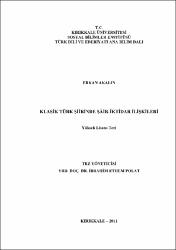Klasik Türk şiirinde şâir-iktidar ilişkileri
Özet
İnsanoğlunun en temel ihtiyaçlarından birini karşılayan iktidar olma güdüsü hayata dair pek çok ilişki biçiminde olduğu gibi sanat ? saltanat ilişkileri bağlamında da kendine bir yaşam alanı bulmuştur. Bilhassa egemenliğin tek bir kişinin elinde toplandığı patrimonyal karakterli devlet yapılarında ve daha özelde hemen bütün Türk ? İslam devletlerinde, himâye sistemi adı altında cereyan eden sanat ? saltanat ilişkileri, patrimonyal devlet tarifine uyan ve statü odaklı bir devletleşmeyi ifade eden Devlet-i Âl-i Osman'a da güçlü bir örüntü içerisinde tevarüs etmiştir. Birbirlerinin varlığına hemen daima ihtiyaç duyan saray / yöneten / hükmeden de tebaa / yönetilen / hükmedilen de bu ilişki biçiminden kendi iktidarlarını tesis veya muhafaza etmek gayeleriyle çift yönlü olarak faydalanmışlardır. Saray, iktidarının çığırtkanı olarak değerlendirdiği sanatkârlar aracılığıyla gücünü ifşa etmeyi, her zemine duyurmayı ve ismini ebedî / bengü kılmayı, zamana iktidar olmayı hedeflerken; sanatkâr, ortaya koyduğu edebî ürünler ve kendi reklamını yaptığı dizeler vesilesiyle sarayın teveccühüne erişerek ikidara yaklaşmak ve böylece iktidarın olmak istemiştir.Osmanoğullar'ında yüzyıllar boyu bir gelenekmişcesine şiirin ve şâirin iktidarın şiiri / şâiri olmasına, buna karşılık saray ve çevresinin gösterdiği teveccüh ve destekten dolayı şiiri / şâiri iktidar kılmasına müşahitlik eden pek çok bilgi, bulgu ve söylem metinleri bulunmaktadır. Arşiv belgeleri, biyografik eserler, sûrnâmeler, mektuplar ve birtakım şiir tür ve şekilleri bu ilişkinin tanıklarıdırlar. Bu tanıklar içerisinde bilhassa kasîde dizeleri şâir ve iktidar arasındaki alış verişin en yoğun oranda işletildiği, şâirin ve şiirinin saraya en çok yaklaşma imkanı bulduğu kulvar olup genellikle fahriye dizelerinde hayat bulan edebî dilekçeler ile medhiyelerde sözü edilen ve belli tematik bağlarla yapılandırılan memduha dair övgü ve temenni ifadeleri (cömertlik, yiğitlik, âdillik, ahlâklılık, dindârlık, yücelik, ideal oluş ve heybetli oluş) şâir ? iktidar ilişkilerinin boyutlarını yansıtan önemli birer vesikadırlar.Anahtar Sözcükler: İktidar, Klasik Türk Şiiri, Şâir ? İktidar İlişkileri. Motivation of being power that meets one of the basic needs of human has found itself a living space in the context of art-reign relationships as well as may relationships in the form of life. Especially in the patrimonial character state structures in which the sovereignty concentrated in the hands of a single person and more specially nearly all Turkish-İslamic governments patronage system which took place under the name art-reign relations, fit the description of patrimonial state and status of the Ottoman Empire, which focused on the strong expression the stating was inherited in a pattern.Nearly always in need of each other?s existence both of the palace / the ruling / the dominating and of the subjects / the managed /the dominated concerned the purpose of maintaining their power plant, or have benefited from bi-directional from this relationship from. While the palace was being aimed to disclose its power inform everywhere and to make its name eternal endless, immortal through the artists aimed to come up to the power and to be power?s by accessing the kindness of the palace on the occasion of his revealed literary works and the verses in which he has done his own advertisement.There is lots of information, evidence, discourse texts witnees that ?as if it has been a tradition in the Ottoman Empire for centuries- the poetry and poet has been the power?s poetry and poet, correspondingly owing to the kindnees and supports of the palace and its supporters, the poetry and poet has been the power. Archive documents, biographical works, poems of celebration (sûrnâmes), letters and some private forms of poetry are witnesses of this relation. Among these witnesses, expecially in the eulogium verses, relations between the poet and the power are obvious. By this form poetry, the poet reached the palace mostly. Expressions of praise and hope to the praised who were mentioned and were structured some thematic interest (generosity, bravery, fairness, morality, piety, magnanimity, suitability and majesty) in the literary petitions and in the eulogies are important documents that show the relations between the poet and the power.Key Words: Power, Classical Turkish Poetry, Relations of the Poet and the Power.
















